The Godfather of Southwestern Cuisine Defies Expectations in Dallas, Charts a New Restaurant Course: Stephan Pyles is Looking to Texas’ Food Future
BY Annie Gallay // 11.28.18Chef Stephan Pyles
Trailblazing Texas chef Stephan Pyles is carving a new path. He’s kicking up his heels, opening updated and all-new Modern Texan concepts out in the ’burbs — all on the heels of shuttering his iconic downtown Dallas restaurant.
Stampede 66 will soon be sending postcards from Allen. Pyles is looking alive for his treasured restaurant’s new lease on life.
It’s a new chapter for Pyles, generous godfather of Southwestern Cuisine, founding father of Modern Texas cuisine, cookbook author, philanthropist, creator of popular Flora Street Cafe, first person in the Southwest to win a James Beard Award for Best Chef, and pupil of none other than Julia Child.
When it comes to this chef, think casual-meets-creative and fine dining at its friendliest, elevated eats that are easy on the eyes.
His dishes really are Modern Texas Cuisine, courtesy of the chef that saw American dishes take off in a scene steeped in strictly French sensibilities. And he didn’t just ride the wave — he created the ripples.
His Lone Star State ties date back five generations, and that Texas touch has defined the 22 foodie havens he’s created in five cities over the past 30-odd years. And those on that wide-open Texas horizon.
“I would consider myself in-your-face Texas. I’ve always been an ambassador, a promoter of all things great about Texas,” Pyles tells PaperCity. His new restaurants will be a little less rustic and a little more refined, but share that Southern feel.
He’s preserving what works, and working on some fresh new ideas.
Pyles bid farewell to Dallas’ Stampede 66 late this October. It’s bye-bye to liquid nitrogen prickly pear margaritas and chicken-fried buffalo steak in that particular locale.
The new Delta Hotels Dallas Allen & Water Creek Convention Center in Allen is the new site of Stampede 66, alongside two new Pyles-proffered concepts: on-the-go restaurant Provisions 66 and cocktail bar Canyon Bar.
Canyon Bar will be all about artisanal cocktails and lobster quesadillas. Provisions 66 will offer a high-quality alternative to room service, a sort of gourmet takeout.
Pyles has pinpointed Texas after his long venture into Southwestern Cuisine, a culinary collab with the likes of Cafe Annie and Diana American Grill’s Robert Del Grande that kicked off 30 years ago.
“We were doing something very local, but with classic French techniques,” Pyles says.
You can thank the press for the Southwestern name —for its original focus on Texas, New Mexico and Arizona, the whole Southwest. No stone unturned, no ingredient untried.
“Over the years, each of us have kind of evolved and taken our style of Southwestern to a different level. I kind of brought my focus back to Texas,” Pyles notes.
“It’s now considered Modern Texas cuisine. As we say in Texas — dance with the one that brung you,” Pyles laughs. “I’ve done many concepts, and the ones that are the most successful are the ones that involve Texas.”
That looks like fried chicken, buttermilk biscuits, peach cobbler — and chilis, empanadas, tamales and tacos at Stampede 66, and lobster, caviar and truffles for Flora Street Cafe’s elevated Texas cuisine.
“I like to think I create dishes that didn’t exist before. Flavors that are very local, that feel local, but feel fresh and new, and something you haven’t had,” Pyles says. “We’re in Texas eating chilis, we’re eating Masa, we’re eating smoked meats — but in a way you’ve never tasted.”
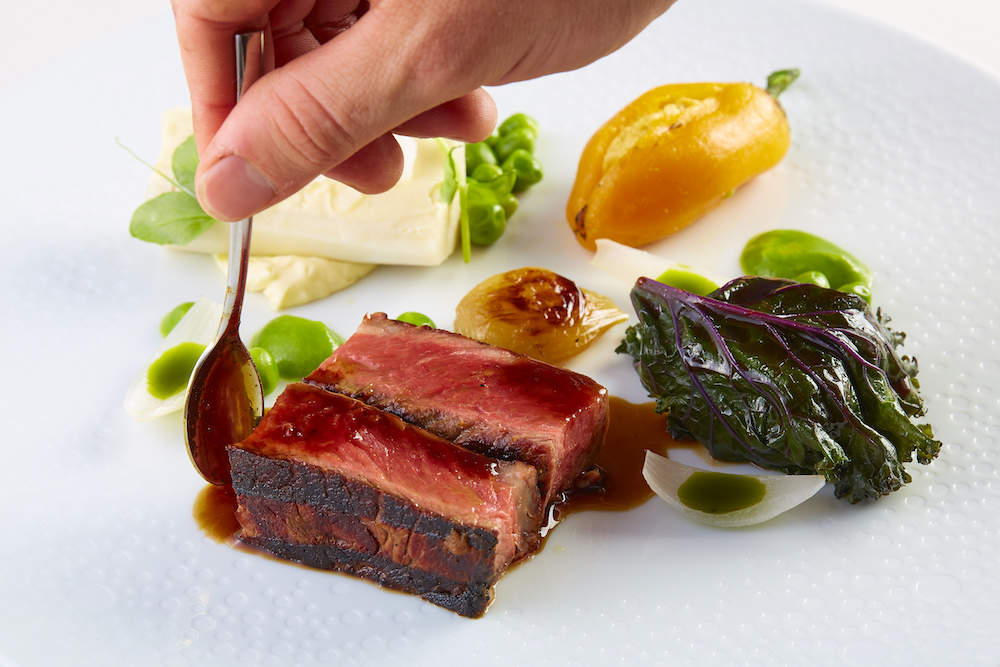
Pyles strives for well-balanced flavors in Flora Street dishes like bacon-wrapped rabbit loin with huitlacoche, poblano infladito with a black bean mousse, lemongrass poached halibut with mole blanco.
“If you eat something and have a bite of it, it might taste good — but what does it do in your palate? It should have a beginning, a middle and an end,” Pyles says. “It should have the right texture, acid, balance — a little sweetness, a little umami.
“One bite of something, and it becomes something other than that first bite. It really is a full circle of flavors.”
For Stampede 66, that means great, classic dishes like fried chicken, like barbecue brisket, like chicken fried steak.
“But I do something unusual to each one of those things,” Pyles says.
That means a lot of sous vide cooking — an unexpected, refined French technique for dishes like his signature Honey Fried Chicken. It’s an elegant, European twist on the recipe passed down from his grandmother.
Pyles marinates the chicken in a salt brine, sous vides the meat for several hours until it’s moist through-and-through, then fries it lightly in your typical buttermilk and flour breading.
But here’s where it gets interesting: he injects the juicy meat with a culinary hypodermic needle filled with warm, local Texas honey. “That’s one take on good ol’ fashioned fried chicken,” he laughs.
Pyles takes on hearty brisket in similar fashion. It’s an involved process, and you better believe good things take time. The chef marinates the Texas Wagyu beef in a dry rub — think spices, chilis, salt and a little sugar — for a full 24 hours before smoking it for 24 hours and then cooking it oh-so-slowly in a sous vide for 72 hours. Then, it’s finished off on the grill.
“That’s my version. That’s why I call it ‘Modern Texas,’” Pyles says.
Flora Power
He takes it all to the next level at Flora, the sacred space for his sophisticated cooking, replete with that lobster and those truffles. There’s even more sous vide action, and those liquid nitrogen moves that made his margs so notorious.
“I’m able to use things, at least on the tasting menu, that are indigenous to Mexico that people are a little suspicious of in this country. People come here to be challenged and to have an adventure,” the chef notes.
The most surprising trick up his sleeve? Chapulines, or little grasshoppers. “They’re so delicious,” he laughs.
And when it comes to putting his spin on traditional Mexican dishes, it’s the mole, the merrier. His dry-powdered mole negro is like nothing you’ve seen before, made through a days-long reduction and dehydration process, leaving a satisfying, substantive and downright delicious dust.
“We sprinkle this powder on the plate with the beef — it’s very good on ice cream, too,” he says.
Tinkering with these modern techniques has always been in Pyles’ wheelhouse. You could say he was light-years ahead of diners some decades ago, but they’ve been more than down to play some culinary catch-up.
“It’s interesting to see how the public’s palate has grown with world travel. Just the sophistication of today’s diners is much different,” Pyles says.
Here and now, you don’t have to be a white-table cloth establishment to have food that’s out of this stratosphere. “You can do something really fun and casual and get great accolades. There’s room for all of that.”
It’s time for a history lesson that’ll leave your taste buds tingling. And it’s early days for this stage in the evolution, Pyles says. “It’s basically only one generation old, only. There was nothing of repute in this country in terms of American food really before 1980,” he says.
We’ve come a long way to the age of the casual gourmand, and Pyles hasn’t forgotten where we came from. It’s only recently that cooks at home and chefs started tiptoeing toward making food from scratch, then onto farm and table.
With European recipes. “If you think about all the good restaurants in the 1970s, they were all French or continental,” Pyles says. “If there was an ‘American’ restaurant, it was a diner — burgers, fried chicken, meatloaf.”
Then, the 1980s. “There was an awakening in this country for food,” Pyles smiles. And that awakening led to the birth of his Flora Street playlist — a blend of the height of refinement and height of hair bands. 1980s jams, say hello to Handel.
“It sounds kind of funny, but it works. It’s really weird to go from Mozart to Van Halen. But it works. At least, it does for me,” Pyles laughs.
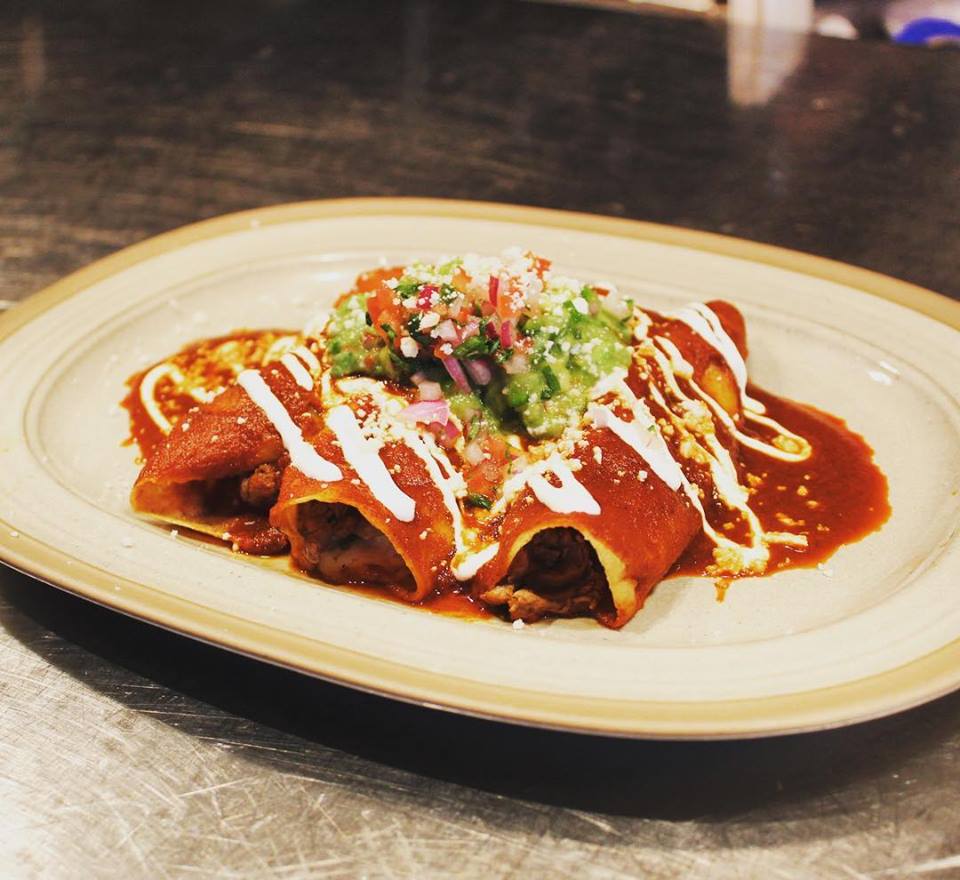
He was dead-set on being in that premiere, that prime-time 1980s preview into what American cuisine was capable of.
It was the time for him to shine, along with his culinary counterparts around the country that he lists with admiration — Wolfgang Puck and Paul Prudhomme in Cajun-Creole cuisine, Allen Susser in Floridian, Roy Yamaguchi in Hawaiian.
American, truly American dishes, came to the foodie forefront in the eighties.
“Serious American food had come into its own,” Pyles says.
And so had he. One Julia Child can take credit for Pyles cutting his teeth on French cuisine, years before he gave birth to Southwestern and later, Modern Texas.
“The first chef I asked to assist was Julia Child. I was scared to death,” Pyles laughs.
“But we had an immediate camaraderie and just liked each other a lot immediately. I ended up spending a lot of time with her, including some time at her house in the south of France. She really was a mentor.”
Child’s house was side-by-side with Simone Beck’s, her partner in Mastering the Art of French Cooking, Pyles recalls.
From Julia Child to Alice Waters
While Pyles mastered technique under Child’s tutelage, he learned the art of ingredients, flavors and how to build a business under a trio of dedicated domestic mentors: Alice Waters, Jeremiah Tower and Wolfgang Puck.
His connection with Waters grew organically — literally. “I learned a lot from Alice just seeing how she foraged. She was the first person to really do organic farm-to-table,” Pyles says. Waters would have someone on staff who created contacts for unusual products and products that were at the absolute peak freshness and ripeness.
“I learned a lot in terms of how to develop a menu, and how to do it sustainably and sensibly. I really want to remain Texan at heart, and that’s all about locale and seasonality. Use the products that are closest to you.”
Puck’s power in empire-building awed Pyles. “I would like to have an empire in so many states right now. He’s just a very friendly, affable guy. You would never know he was such a businessman,” he says.
For now, Pyles building his formidable brand — and maybe crafting a new cookbook. Nothing’s decided just yet, but as you may have guessed, for Pyles everything is about the process. “I’m kind of working on an elevated Texas cookbook. I’m doing it slowly. It’s just something to think about and work on,” Pyles says.
The chef ushered in a new era of American cooking, refining from Southwestern to Modern and Elevated Texas. We don’t know what’s coming next, but it’s a pretty good bet Stephan Pyles will be there, out front of the trend.




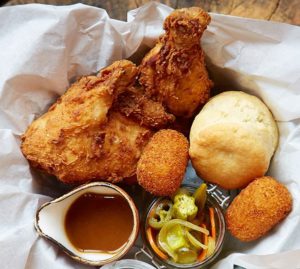
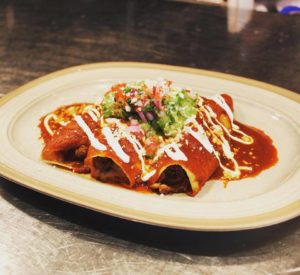
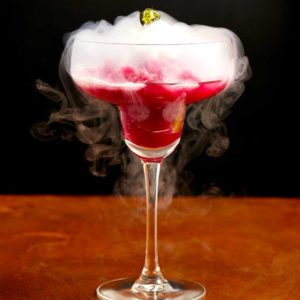
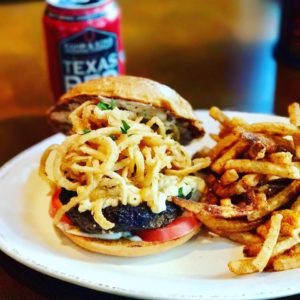



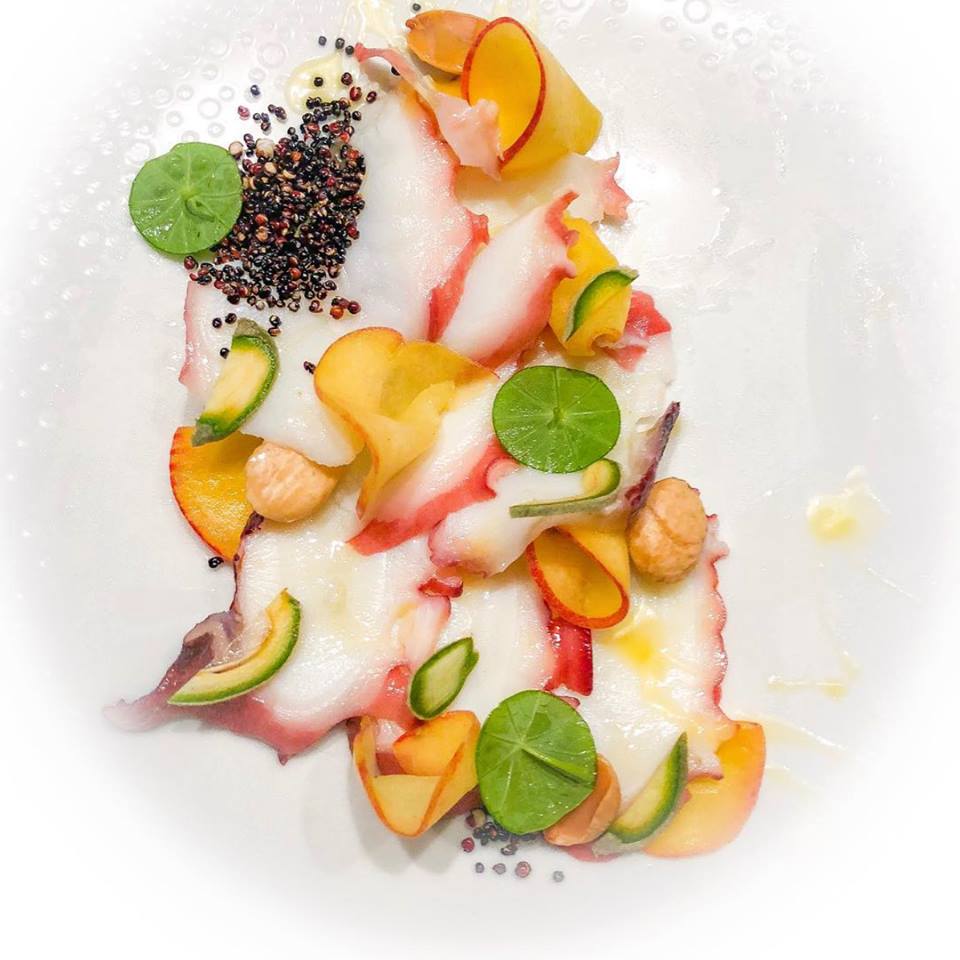
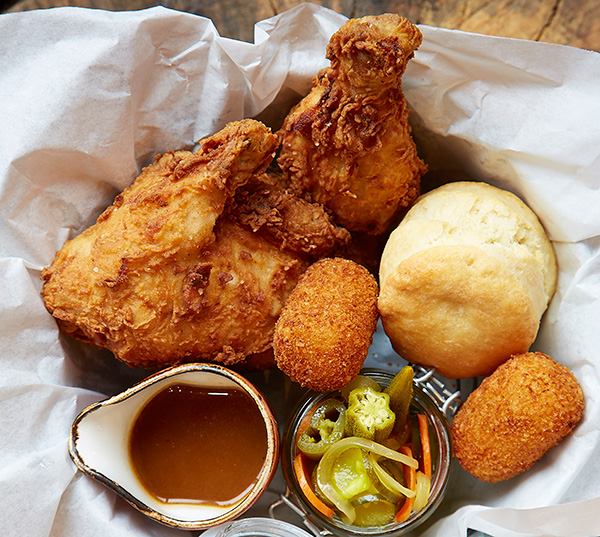


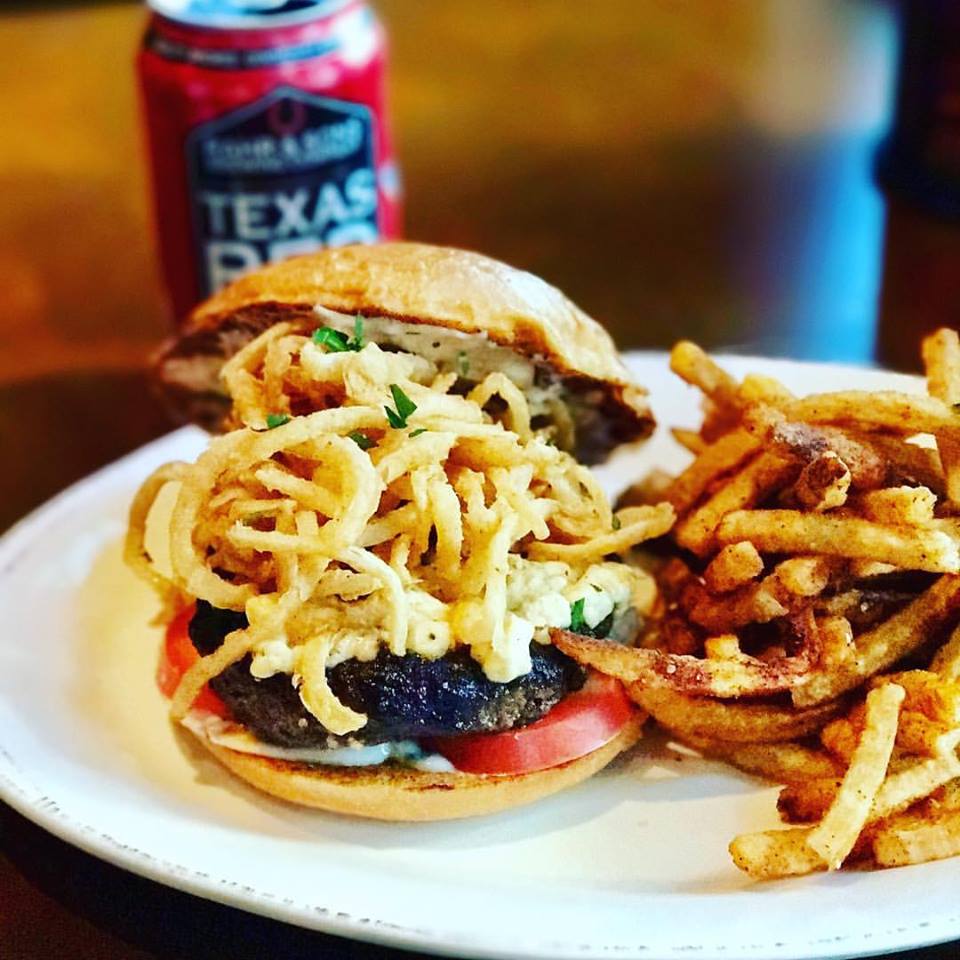











_md.jpg)
_md.jpg)










_md.jpg)










_md.jpg)



_md.jpg)

_md.jpg)















_md.jpg)


_md.jpg)
_md.jpg)
